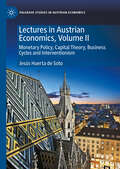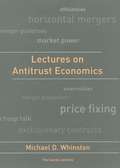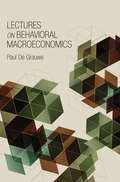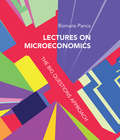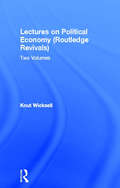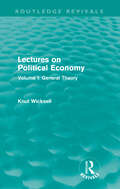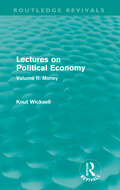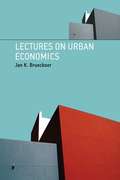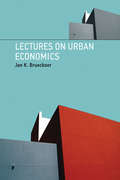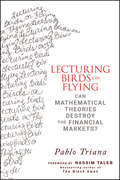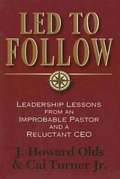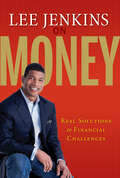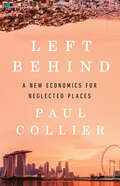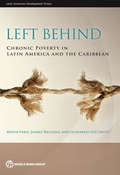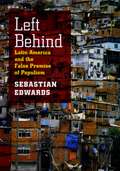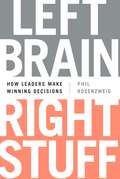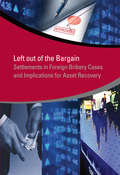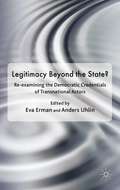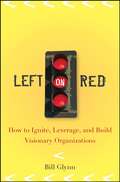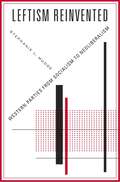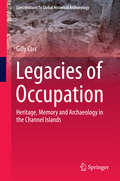- Table View
- List View
Lectures in Austrian Economics, Volume II: Monetary Policy, Capital Theory, Business Cycles and Interventionism (Palgrave Studies in Austrian Economics)
by Jesús Huerta de SotoThis book, the second of two volumes, provides a comprehensive overview of the core topics within Austrian economics. With a focus on macroeconomics, it explores foundational ideas within Austrian economics, including monetary and banking theory, law, capital theory, business cycles, the relationship between the market and the state, and interventionism. These ideas are contextualized within the history of economic thought, in particular the work of Ludwig von Mises. The Keynesian system, reform to the banking system, wages, social order, fiscal policy, and the political economy of ethics are also discussed. This book offers an accessible and engaging synthesis of Austrian economics that redefines the topic within modern economics. It will be relevant to students and researchers interested in Austrian economics and the political economy.
Lectures on Antitrust Economics
by Michael D. WhinstonAntitrust law regulates economic activity but differs in its operation from what is traditionally considered "regulation." Where regulation is often industry-specific and involves the direct setting of prices, product characteristics, or entry, antitrust law focuses more broadly on maintaining certain basic rules of competition. In these lectures Michael Whinston offers an accessible and lucid account of the economics behind antitrust law, looking at some of the most recent developments in antitrust economics and highlighting areas that require further research. He focuses on three areas: price fixing, in which competitors agree to restrict output or raise price; horizontal mergers, in which competitors agree to merge their operations; and exclusionary vertical contracts, in which a competitor seeks to exclude a rival. Antitrust commentators widely regard the prohibition on price fixing as the most settled and economically sound area of antitrust. Whinston's discussion seeks to unsettle this view, suggesting that some fundamental issues in this area are, in fact, not well understood. In his discussion of horizontal mergers, Whinston describes the substantial advances in recent theoretical and empirical work and suggests fruitful directions for further research. The complex area of exclusionary vertical contracts is perhaps the most controversial in antitrust. The influential "Chicago School" cast doubt on arguments that vertical contracts could be profitably used to exclude rivals. Recent theoretical work, to which Whinston has made important contributions, instead shows that such contracts can be profitable tools for exclusion. Whinston's discussion sheds light on the controversy in this area and the nature of those recent theoretical contributions. Sponsored by the Universidad Torcuato Di Tella
Lectures on Behavioral Macroeconomics
by Paul De GrauweIn mainstream economics, and particularly in New Keynesian macroeconomics, the booms and busts that characterize capitalism arise because of large external shocks. The combination of these shocks and the slow adjustments of wages and prices by rational agents leads to cyclical movements. In this book, Paul De Grauwe argues for a different macroeconomics model--one that works with an internal explanation of the business cycle and factors in agents' limited cognitive abilities. By creating a behavioral model that is not dependent on the prevailing concept of rationality, De Grauwe is better able to explain the fluctuations of economic activity that are an endemic feature of market economies. This new approach illustrates a richer macroeconomic dynamic that provides for a better understanding of fluctuations in output and inflation. De Grauwe shows that the behavioral model is driven by self-fulfilling waves of optimism and pessimism, or animal spirits. Booms and busts in economic activity are therefore natural outcomes of a behavioral model. The author uses this to analyze central issues in monetary policies, such as output stabilization, before extending his investigation into asset markets and more sophisticated forecasting rules. He also examines how well the theoretical predictions of the behavioral model perform when confronted with empirical data. Develops a behavioral macroeconomic model that assumes agents have limited cognitive abilities Shows how booms and busts are characteristic of market economies Explores the larger role of the central bank in the behavioral model Examines the destabilizing aspects of asset markets
Lectures on Microeconomics: The Big Questions Approach (The\mit Press Ser.)
by Romans PancsEconomic concepts and techniques presented through a series of "big questions," models that show how to pose a questions rigorously and work toward an answer.This book helps readers master economic concepts and techniques by tackling fundamental economic and political questions through a series of models. It is organized around a sequence of “big questions,” among them: When do markets help translate individuals' uncoordinated, selfish actions into outcomes that are best for all? Do markets change people, and, if so, for worse or better? Translated into the language of modern economics, do Marx's ideas have merit? Why is there so much income inequality? Or is there too little? The arguments are in the theorem-proof format, distinguishing results derived in the context of fully specified models from educated speculation. Readers will learn how to pose a question rigorously and how to work toward an answer, and to appreciate that even (especially!) the broadest and most ambitious questions call for a model. The goal of the book is not to indoctrinate but to show readers how to reason toward their own conclusions.The first chapter, on the Walrasian model of general equilibrium, serves as the prerequisite for the rest of the book. The remaining chapters cover less conventional topics, including the morality of markets; matching theory; Marxism, socialism, and the resilience of markets; a formalization of Kant's categorical imperative; unintended consequences of policy design; and theories of justice. The book can be used as a textbook for advanced undergraduate or graduate students or as a resource for researchers in disciplines that draw on normative economics.
Lectures on Political Economy: Two Volumes (Routledge Revivals: Lectures on Political Economy)
by Knut WicksellKnown as the "economist's economist" for his work on creating a synthetic economic theory, Swedish economist Knut Wicksell was a controversial, but highly influential figure in modern economic thought. His contributions to marginal productivity theory, income distribution and, most notably, his theory of interest would come to have a profound impact upon twentieth century economic theory, not least in the work of John Maynard Keynes. First published in English in 1934 and 1935, this Routledge Revival set is a reissue of Wicksell's two volume work on political economy, first published in Sweden in 1901 and 1906. This work is aimed at both the professional economist and the advanced student alike, as well as all those interested in the theoretical development of political economy. Volume I concerns itself predominantly with issues of theory: specifically the theory of value, the theory of production and distribution and the theory of capital accumulation. Volume II deals with theories relating to money, currency and credit.
Lectures on Political Economy: Volume I: General Theory (Routledge Revivals: Lectures on Political Economy)
by Knut WicksellFirst published in English in 1934, this Routledge Revival is a reissue of Volume I of Swedish economist Knut Wicksell's hugely influential work two volume work on political economy, a text which influenced a generation of economists. Concerned predominiantly with a mathematical treatment of issues of economic theory, the first volume deals specifically the theory of value, the theory of production and distribution and the theory of capital accumulation. Wicksell examines the origin of interest and offers a solution to the problem of distribution under capitalistic production, referencing the work of Eugen vom Böhm-Bawerk and Karl Gustav Cassel.
Lectures on Political Economy: Volume II: Money (Routledge Revivals: Lectures on Political Economy)
by Knut WicksellFirst published in English in 1935, this Routledge Revival is a reissue of Volume II of Knut Wicksell's Lectures on Political Economy. This volume deals with his contribution to macroeconomics, through an explication of economic theory and principle relating specifically to money, both in terms of functions and value, with a particular emphasis upon currency and credit. This volume also includes Wicksell's work on the quantity theory of money in which he first made the important distinction between the real rate of return on new capital (which he called the "natural rate of interest") and the actual market rate of interest.
Lectures on Urban Economics
by Brueckner Jan K.Lectures on Urban Economics offers a rigorous but nontechnical treatment of major topics in urban economics. To make the book accessible to a broad range of readers, the analysis is diagrammatic rather than mathematical. Although nontechnical, the book relies on rigorous economic reasoning. In contrast to the cursory theoretical development often found in other textbooks, Lectures on Urban Economics offers thorough and exhaustive treatments of models relevant to each topic, with the goal of revealing the logic of economic reasoning while also teaching urban economics. Topics covered include reasons for the existence of cities, urban spatial structure, urban sprawl and land-use controls, freeway congestion, housing demand and tenure choice, housing policies, local public goods and services, pollution, crime, and quality of life. Footnotes throughout the book point to relevant exercises, which appear at the back of the book. These 22 extended exercises (containing 125 individual parts) develop numerical examples based on the models analyzed in the chapters. Lectures on Urban Economics is suitable for undergraduate use, as background reading for graduate students, or as a professional reference for economists and scholars interested in the urban economics perspective.
Lectures on Urban Economics
by Jan K. BruecknerA rigorous but nontechnical treatment of major topics in urban economics. Lectures on Urban Economics offers a rigorous but nontechnical treatment of major topics in urban economics. To make the book accessible to a broad range of readers, the analysis is diagrammatic rather than mathematical. Although nontechnical, the book relies on rigorous economic reasoning. In contrast to the cursory theoretical development often found in other textbooks, Lectures on Urban Economics offers thorough and exhaustive treatments of models relevant to each topic, with the goal of revealing the logic of economic reasoning while also teaching urban economics. Topics covered include reasons for the existence of cities, urban spatial structure, urban sprawl and land-use controls, freeway congestion, housing demand and tenure choice, housing policies, local public goods and services, pollution, crime, and quality of life. Footnotes throughout the book point to relevant exercises, which appear at the back of the book. These 22 extended exercises (containing 125 individual parts) develop numerical examples based on the models analyzed in the chapters. Lectures on Urban Economics is suitable for undergraduate use, as background reading for graduate students, or as a professional reference for economists and scholars interested in the urban economics perspective.
Lecturing Birds on Flying
by Nassim Nicholas Taleb Pablo TrianaPraise for Lecturing Birds On Flying"Finally, a book taking a critical look at quantitative finance models, illuminating both their flawed fantasy assumptions as well as the uncritical use of such models on Wall Street, in many cases, leading to billion dollar losses. Pablo Triana knows both the financial industry and the academic community from the inside. A must-read for anyone interested in finance."--Dr. Espen Gaarder Haug, trader, thinker, and author of Derivatives Models on Models"A thoroughly readable explanation of the problems that have beset the models and quantitative techniques that have underpinned so much of finance in recent years. If only the bankers had heeded this message a few years before, we might not be in such a big mess today."--Gillian Tett, Assistant Editor of the Financial Times, overseeing global financial markets coverage, and author of Fool's Gold"Pablo Triana dismembers quantitative finance, in theory and in practice, with expertise, anger,and an excellent eye for the illuminating anecdote. By the time he has finished marshalling his evidence, his call to replace complex equations with something more like common sense sounds like, well, common sense."--Edward Hadas, Assistant Editor at Breakingviews.com; and author of Human Goods, Economic Evils: A Moral Approach to the Dismal Science"Pablo Triana is an entertaining and engaging writer, even on the dry subject of finance theory. His debunking of conventional wisdom is a treat."--Pauline Skypala, Editor, FTfm, Financial Times"Triana's book is an unrelenting fusillade of detailed and irrefutable arguments against financial theorems and those who teach them. It should, by rights, spark a revolution in both investment banks and business schools. But, at the very least, it is required reading for anyone who would regulate the finance industry."--Felix Salmon, Finance Blogger, Reuters
Led to Follow: Leadership Lessons from an Improbable Pastor and a Reluctant CEO
by J. Howard Olds Cal Turner JR.With an open, honest, and conversational style, a minister who also manages and a manager who also ministers share insights they've gained through failures, successes, and struggles in their personal and professional journeys. From crises in the family business to existential struggles in the face of recurring cancer, what they show us is this: the heart and soul of leadership is found in following: following your call, following others' input, following your failures, following change, and even following the unknown. If you seek wisdom for your journey, if you seek a life of deep dedication and fulfillment, this book is for you.
Lee Jenkins on Money: Real Solutions to Financial Challenges
by Lee JenkinsAn unstable economy. A shaky stock market. Businesses facing huge financial losses. People losing their homes, jobs, savings, and...hope?Is the sky falling in? Some feel that way. Is God still in control? Others wonders as they see and experience fallout from the greed and corruption that is seemingly pushing our nation to the brink of bankruptcy. In Lee Jenkins on Money, financial analyst Lee Jenkins answers questions about the nation's changing economy and other financial matters readers may be facing in the midst of this difficult financial climate. He helps them take a sober and responsible look at their finances and challenges them to be faithful stewards over what God has entrusted to them. Lee shows that by looking at life from God's perspective and applying biblical principles to their finances, readers bear witness to the fact that God is still in control and there is still hope.
Lee Jenkins on Money: Real Solutions to Financial Challenges
by Lee JenkinsAn unstable economy. A shaky stock market. Businesses facing huge financial losses. People losing their homes, jobs, savings, and...hope?Is the sky falling in? Some feel that way. Is God still in control? Others wonders as they see and experience fallout from the greed and corruption that is seemingly pushing our nation to the brink of bankruptcy. In Lee Jenkins on Money, financial analyst Lee Jenkins answers questions about the nation's changing economy and other financial matters readers may be facing in the midst of this difficult financial climate. He helps them take a sober and responsible look at their finances and challenges them to be faithful stewards over what God has entrusted to them. Lee shows that by looking at life from God's perspective and applying biblical principles to their finances, readers bear witness to the fact that God is still in control and there is still hope.
Leerink Swann & Co.: Creating Competitive Advantage
by Boris Groysberg Andrew N. McleanIn the spring of 2005, CEO Jeff Leerink has called a meeting of the executive committee to formulate Leerink Swann's growth strategy over the next five years so that it accomplishes three goals: expand into a new business, reinforce the firm's legacy businesses, and maximize the synergies between different parts of the firm. Covers the history of the boutique investment bank, including the nature and source of its personnel and culture, the development of its competitive strategy, the leadership style of its founder, and the development of each department, product, and function.
Leerstellenmanagement in der Planung und Steuerung des Change Management von Bautechnologieunternehmen
by Dominic BannholzerProbabilistisch gesehen werden Unternehmen Change Management erfolgreich betreiben müssen, um nachhaltig erfolgreich zu sein. Dominic Bannholzer stellt in seiner Untersuchung – auch basierend auf der breit geführten wissenschaftlichen Diskussion – fest, dass die Veränderungsprozesse oftmals zu starr gestaltet sind, Emergenz nicht (oder nur selten) zugelassen wird und kybernetische Möglichkeiten vernachlässigt werden. Ferner wird dargelegt, welche Bedeutung z.B. die Kommunikation sowie die Partizipation von Mitarbeitenden hat. Daraus abgeleitet werden Lösungen präsentiert, wie die autopoietische Fähigkeit von Unternehmen erfolgversprechender gestaltet werden kann, in dem gezielt «Leerstellen» im Veränderungsprozess implementiert werden. Konkret wird erforscht, welche Bedeutung Sinnlücken, Führungslücken, räumliche und soziale Lücken sowie Kommunikations- und Beziehungslücken für den Veränderungsprozess haben und wie damit erfolgsversprechend umzugehen ist. Dieses Buch beleuchtet Aspekte, welche in dieser Form bisher einzigartig sind und, wenn man das bisherige Forschungsfeld betrachtet, als besonders innovativ und erfolgsversprechend angesehen werden dürfen.
Left Behind: A New Economics for Neglected Places
by Paul CollierFrom the bestselling author of The Bottom Billion, the fate of the poorest regions of the world–some of which exist in the richest nations–is examined. Using examples of the &“left behind&” regions, renowned development economist Paul Collier shows that centralized western economies have been the most ineffective to alleviate poverty—even if nationally the country seems to be growing. In Left Behind, Collier examines how the assumption that any impoverished area will find a way to progress through market forces has devastated nations all over the world. With keen insight, he draws lessons from such disparate fields as behavioral psychology, evolutionary biology, and moral philosophy to explain how we can adapt to the needs of individual economies in order to build a brighter and fairer global future.
Left Behind: Chronic Poverty in Latin America and the Caribbean
by Jamele Rigolini Renos Vakis Leonardo LucchettiOne out of every five Latin Americans or around 130 million people have never known anything but poverty, subsisting on less than US$4-a-day throughout their lives. These are the region´s chronically poor, who have remained so despite unprecedented inroads against poverty in Latin America and the Caribbean since the turn of the century. Left Behind: Chronic Poverty in Latin America and the Caribbean takes a closer look at the region's entrenched poor, who and where they are, and how existing policies need to change in order to effectively assist them. The book shows significant variations of rates of chronic poverty both across and within countries. Within a single country, some regions show incidence rates up to eight times higher than the lowest. Despite the higher rates of chronic poverty in rural areas, chronic poverty is as much an urban as a rural issue. In fact, considering absolute numbers, urban areas in many countries, including Chile, Brazil, Mexico, Colombia and the Dominican Republic, have more chronic poor than rural areas. Undoubtedly the region has come a long way during the decade in terms of poverty reduction, guided by a mix of sustained growth and increased levels in amounts and quality of public spending and programs targeted directly or indirectly to the chronic poor. While improving endowments and the context where the chronic poor live is a necessary condition going forward, the decade's experience suggests that it may not be enough to reach the chronic poor. The book posits that refinements to the existing policy toolkit " as opposed to more programs " may come a long way in helping the remaining poor. These refinements include intensifying efforts to improve coordination between different social and economic programs, which can boost the income generation process and deal with the intergenerational transmission of chronic poverty by investing in early childhood development. Equally important though, there is an urgent need to adapt programs to directly address the psychological toll of chronic poverty on people's mindset and aspirations, which currently undermines the effectiveness of the existing policy efforts.
Left Behind: Latin America and the False Promise of Populism
by Sebastian EdwardsThe political and economic history of Latin America has been marked by great hopes and even greater disappointments. Despite abundant resources--and a history of productivity and wealth--in recent decades the region has fallen further and further behind developed nations, surpassed even by other developing economies in Southeast Asia and elsewhere. In Left Behind, Sebastian Edwards explains why the nations of Latin America have failed to share in the fruits of globalization and forcefully highlights the dangers of the recent turn to economic populism in the region. He begins by detailing the many ways Latin American governments have stifled economic development over the years through excessive regulation, currency manipulation, and thoroughgoing corruption. He then turns to the neoliberal reforms of the early 1990s, which called for the elimination of deficits, lowering of trade barriers, and privatization of inefficient public enterprises--and which, Edwards argues, held the promise of freeing Latin America from the burdens of the past. Flawed implementation, however, meant the promised gains of globalization were never felt by the mass of citizens, and growing frustration with stalled progress has led to a resurgence of populism throughout the region, exemplified by the economic policies of Venezuela's Hugo Chávez. But such measures, Edwards warns, are a recipe for disaster; instead, he argues, the way forward for Latin America lies in further market reforms, more honestly pursued and fairly implemented. As an example of the promise of that approach, Edwards points to Latin America's giant, Brazil, which under the successful administration of President Luis Inácio da Silva (Lula) has finally begun to show signs of reaching its true economic potential. As the global financial crisis has reminded us, the risks posed by failing economies extend far beyond their national borders. Putting Latin America back on a path toward sustained growth is crucial not just for the region but for the world, and Left Behind offers a clear, concise blueprint for the way forward.
Left Behind: The Democrats' Failed Attempt to Solve Inequality
by Lily GeismerThe 40-year history of how Democrats chose political opportunity over addressing inequality—and how the poor have paid the priceFor decades, the Republican Party has been known as the party of the rich: arguing for &“business-friendly&” policies like deregulation and tax cuts. But this incisive political history shows that the current inequality crisis was also enabled by a Democratic Party that catered to the affluent.The result is one of the great missed opportunities in political history: a moment when we had the chance to change the lives of future generations and were too short-sighted to take it.Historian Lily Geismer recounts how the Clinton-era Democratic Party sought to curb poverty through economic growth and individual responsibility rather than asking the rich to make any sacrifices. Fueled by an ethos of &“doing well by doing good,&” microfinance, charter schools, and privately funded housing developments grew trendy. Though politically expedient and sometimes profitable in the short term, these programs fundamentally weakened the safety net for the poor.This piercingly intelligent book shows how bygone policy decisions have left us with skyrocketing income inequality and poverty in America and widened fractures within the Democratic Party that persist to this day.
Left Brain, Right Stuff: How Leaders Make Winning Decisions
by Phil RosenzweigLeft Brain, Right Stuff takes up where other books about decision making leave off. For many routine choices, from shopping to investing, we can make good decisions simply by avoiding common errors, such as searching only for confirming information or avoiding the hindsight bias. But as Phil Rosenzweig shows, for many of the most important, more complex situations we face-in business, sports, politics, and more-a different way of thinking is required. Leaders must possess the ability to shape opinions, inspire followers, manage risk, and outmaneuver and outperform rivals. Making winning decisions calls for a combination of skills: clear analysis and calculation-left brain-as well as the willingness to push boundaries and take bold action-right stuff. Of course leaders need to understand the dynamics of competition, to anticipate rival moves, to draw on the power of statistical analysis, and to be aware of common decision errors-all features of left brain thinking. But to achieve the unprecedented in real-world situations, much more is needed. Leaders also need the right stuff. In business, they have to devise plans and inspire followers for successful execution; in politics, they must mobilize popular support for a chosen program; in the military, commanders need to commit to a battle strategy and lead their troops; and in start-ups, entrepreneurs must manage risk when success is uncertain. In every case, success calls for action as well as analysis, and for courage as well as calculation. Always entertaining, often surprising, and immensely practical, Left Brain, Right Stuff draws on a wealth of examples in order to propose a new paradigm for decision making in synch with the way we have to operate in the real world. Rosenzweig’s smart and perceptive analysis of research provides fresh, and often surprising, insights on topics such as confidence and overconfidence, the uses and limits of decision models, the illusion of control, expert performance and deliberate practice, competitive bidding and new venture management, and the true nature of leadership.
Left Out of the Bargain
by Ji Won Park Jeanne M. Hauch Agustin Flah Dorothee Gottwald Francisca M.U. Fernando Jacinta Anyango Oduor Marianne Mathias Oliver StolpeOver the past decade, countries have increasingly used settlements-that is, any procedure short of a full trial-to conclude foreign bribery cases and have imposed billions in monetary sanctions. There exists a gap in knowledge, however, regarding settlement practices around the world and the disposition of these monetary sanctions-notably through the lens of recovery of stolen assets. Left out of the Bargain, a study by the Stolen Asset Recovery Initiative (StAR), provides an overview of settlement practices by civil and common law countries that have been active in the fight against foreign bribery. Using the United Nations Convention against Corruption (UNCAC) as its point of reference, the study addresses concerns voiced by the international community: What happens to the money associated with the settlements, and is it being returned to those most directly harmed by the corrupt practices? And what can be done to assist those countries harmed by foreign bribery? Left out of the Bargain has found that 395 settlement cases took place between 1999 and mid-2012, resulting in a total of US$6.9 billion in monetary sanctions imposed against companies and individuals. Of this amount, nearly US$6 billion came from settlements that took place in a country different from that of the allegedly bribed foreign public officials. But only about US$197 million, or 3 percent, has been returned or ordered returned to the countries whose officials were accused of accepting bribes. Left out of the Bargain urges countries whose officials were allegedly bribed to intensify their efforts to investigate and prosecute the providers and recipients of foreign bribes, hence improving these countries' prospects for recovery of assets lost through corruption. The study also calls for more proactive international cooperation and coordination to ensure that all affected countries are afforded the opportunity to seek redress for harms suffered and for the recovery of assets-thus fulfilling the principles set out in UNCAC.
Left Parties in National Governments
by Eva Erman Anders UhlinCombining case studies with normative theory, this book analyzes the democratic credentials of transnational actors participating in global governance, ranging from corporations and philanthropic foundations to NGOs and social movements. This leads to innovative interpretations of democratic legitimacy in a transnational context.
Left on Red
by Bill GlynnIn Left on Red, venture capitalist and business innovator Bill Glynn reveals how visionary thinkers and risk-takers build great companies by doing the opposite of the expected. Today?s coolest and most successful businesses?including Google, Apple, and YouTube?were built by people who break the rules and bring radical ideas to life. If you?re an entrepreneur or an executive, this book gives you the inspiration and the guidance to bring your radical ideas to life?and change the world in the process.
Leftism Reinvented: Western Parties from Socialism to Neoliberalism
by Stephanie L. MudgeLeft-leaning political parties play an important role as representatives of the poor and disempowered. They once did so by promising protections from the forces of capital and the market’s tendencies to produce inequality. But in the 1990s they gave up on protection, asking voters to adapt to a market-driven world. Meanwhile, new, extreme parties began to promise economic protections of their own—albeit in an angry, anti-immigrant tone. To better understand today’s strange new political world, Stephanie L. Mudge’s Leftism Reinvented analyzes the history of the Swedish and German Social Democrats, the British Labour Party, and the American Democratic Party. Breaking with an assumption that parties simply respond to forces beyond their control, Mudge argues that left parties’ changing promises expressed the worldviews of different kinds of experts. To understand how left parties speak, we have to understand the people who speak for them. Leftism Reinvented shows how Keynesian economists came to speak for left parties by the early 1960s. These economists saw their task in terms of discretionary, politically-sensitive economic management. But in the 1980s a new kind of economist, who viewed the advancement of markets as left parties’ main task, came to the fore. Meanwhile, as voters’ loyalties to left parties waned, professional strategists were called upon to “spin” party messages. Ultimately, left parties undermined themselves, leaving a representative vacuum in their wake. Leftism Reinvented raises new questions about the roles and responsibilities of left parties—and their experts—in politics today.
Legacies of Occupation
by Gilly CarrThis book explores the way in which the legacy of the German occupation of the Channel Islands has been turned into heritage (or, conversely, neglected) over the last 70 years. Once seen as the 'taint of the mark of the beast', the perception of much of what the Germans left behind has slowly changed from being despised and reviled, buried underground or dumped at sea, to being reclaimed, restored, highly valued and treated as 'heritage'. This book examines the journey of various aspects of this heritage, exploring the role of each post-war generation in picking at the scar of occupation, refusing to let it heal or fade. By discovering and interpreting anew their once-hated legacy, each generation of Channel Islanders has changed the resulting collective memory of a period which is rapidly moving to the edge of living memory. It includes the first in-depth investigation into the multiple aspects of heritage of occupation of a single place and will offer comparative material for other heritage professionals who work with similar material throughout Europe and in other post-occupation areas. It will explore the complex ethical issues faced by anyone who works with the legacy or heritage of Nazism, seeking to understand how and why the Channel Islands have responded in the way that they have and asking how unique - or typical for formerly-occupied Europe - their response has been.
